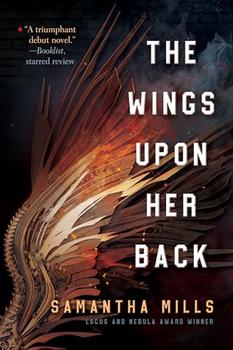Summary | Excerpt | Reviews | Beyond the Book | Readalikes | Genres & Themes | Author Bio

The scholar god required his followers to study and learn, for without scholars, the city would succumb to the mistakes of the past.
The worker god required her followers to labor and maintain, for without workers, there could be no production.
The earth god required his followers to sow and reap, for without farmers, the city would starve.
The mecha god required her followers to protect and judge, for without warriors, the city would fall to the first aggressor.
Wonderful. Concise. But in practice, so much more complicated. We mined the hills and plowed the land and built machines we had never dreamt possible. We were united in worship, in ambition, in a belief that anything was possible as long as we followed the wisdom and guidance of the beings who had chosen us, above all others in the world, as their favored people.
If a city is a story, then ours was beautiful in its simplicity: they came to us, they loved us, they showed us how to live.
We defined ourselves by our gods!
And then our gods went to sleep.
After the gods retreated, blame was laid upon every head. The fighting was immediate, intense. There were documents destroyed, a terrible crime born of terrible grief. We know these things, but our knowledge is a skeleton of the truth.
To preserve their fledgling community, the people of the city not-yet-called-Radezhda divided themselves according to worldview: they lived in separate neighborhoods, they held separate worship. A fragile truce. They were no longer the scattered villagers they had been before the gods' arrival, but they had not yet built the city we know today.
They were sibling districts finding their way forward after a tumultuous youth, each with its own notion of how to proceed.
Two sects put their focus on service, for the farmers and the workers take solace in the good they do their fellows. Two continued the quest for knowledge, for the scholars and the engineers desire answers to all things. And the warriors ... the warriors locked in place, and tried to keep everything as it was, a house undisturbed waiting for its master to come home.
But all of them agreed on this: they longed to see the gods again (for comfort; for answers; for instructions) and so they built towers to the heavens.
The towers are not the concern of this paper. Their construction is well-documented and their schematics thorough. It is the frenzied time period beforehand that is shrouded in debate: the circumstances of the gods' retreat.
Why did they leave us?
The warriors believe we were not pious enough; the engineers believe we were not clever enough; the workers believe we were too lazy. Even the farmers murmur an inscrutable story about a poor planting season so egregious their grandparents' grandparents hoarded jelly jars until their deaths. These reasons are frustratingly vague, even when they are bafflingly specific. (The scholars consider ourselves neutral parties, mere observers and collectors of facts, but make no mistake: we blame the rest.)
It is amazing to me that this pivotal moment in our history, this defining moment—the retreat of the gods from humanity in favor of perpetual sleep—is in such contention.
It is amazing to me that so many of our ancestors were present at this monumental event, and yet our records are so scarce, our interpretations so varied.
What really happened?
And if a city is its history, what does it mean when we do not understand the past?
You will expect, by now, that I have a theory.
Of course I do. Hundreds of opinions have been written on this topic already. Hundreds more will follow mine. The question haunts us: why did the gods go to sleep? We pray, we beg, we preach it from every saint's day stage. We argue it in council meetings till the sun sets, and then we table the discussion and promise to gather again next month to shout about it some more. The ritual is dressed up in formalities so we do not feel like children, always squabbling over the same old hurt.
Excerpted from The Wings Upon Her Back by Samantha Mills. Copyright © 2024 by Samantha Mills. Excerpted by permission of Tachyon Publications. All rights reserved. No part of this excerpt may be reproduced or reprinted without permission in writing from the publisher.




Great political questions stir the deepest nature of one-half the nation, but they pass far above and over the ...
Click Here to find out who said this, as well as discovering other famous literary quotes!
Your guide toexceptional books
BookBrowse seeks out and recommends the best in contemporary fiction and nonfiction—books that not only engage and entertain but also deepen our understanding of ourselves and the world around us.